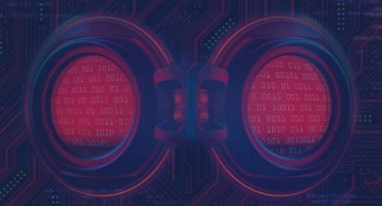Should you take an arch-technocrat at his word? I think so. Larry Ellison is the founder and former chairman of Oracle, the third-largest software company in the world. According to SFGATE, “The CIA was not just Oracle’s first customer. Founded in May 1977, the firm’s name came from a CIA project code-named “Oracle.” Small world, indeed. Listen to the video and be prepared to be shocked.
When I was in the software business in the 1990s, the VP of Sales at Oracle approached me about integrating my sales and marketing software into the growing stable of Oracle products. I thought I had struck it rich! That is, until I got a whiff of their internal culture. The sales manager for Oracle was a woman who affectionately called her sales team her “yuppie guppies.” How cute, I thought, until I asked one of her “guppies” what that meant. He explained that guppies eat their own offspring and if they didn’t make their sales quotas by hook or by crook, they would be escorted off the campus within the hour. Needless to say, I ran as fast as I could to get away from them.
Larry Ellison has never changed his spots over the years. He should have been branded as a menace to society long ago. — Technocracy News & Trends Editor Patrick Wood.
On Thursday, Oracle co-founder Larry Ellison shared his vision for an AI-powered surveillance future during a company financial meeting, reports Business Insider. During an investor Q&A, Ellison described a world where artificial intelligence systems would constantly monitor citizens through an extensive network of cameras and drones, stating this would ensure both police and citizens don’t break the law.
Ellison, who briefly became the world’s second-wealthiest person last week when his net worth surpassed Jeff Bezos’ for a short time, outlined a scenario where AI models would analyze footage from security cameras, police body cams, doorbell cameras, and vehicle dash cams.
“Citizens will be on their best behavior because we are constantly recording and reporting everything that’s going on,” Ellison said, describing what he sees as the benefits from automated oversight from AI and automated alerts for when crime takes place. “We’re going to have supervision,” he continued. “Every police officer is going to be supervised at all times, and if there’s a problem, AI will report the problem and report it to the appropriate person.”
The 80-year-old billionaire also predicted that AI-controlled drones would replace police vehicles in high-speed pursuits. “You just have a drone follow the car,” he explained. “It’s very simple in the age of autonomous drones.”
Ellison co-founded Oracle in 1977 and served as CEO until he stepped down in 2014. He currently serves as the company’s executive chairman and CTO.
Sounds familiar
While Ellison attempted to paint his prediction of universal public surveillance in a positive light, his remarks raise significant questions about privacy, civil liberties, and the potential for abuse in a world of ubiquitous AI monitoring.
Ellison’s vision bears more than a passing resemblance to the cautionary world portrayed in George Orwell’s prescient novel 1984. In Orwell’s fiction, the totalitarian government of Oceania uses ubiquitous “telescreens” to monitor citizens constantly, creating a society where privacy no longer exists and independent thought becomes nearly impossible.
But Orwell’s famous phrase “Big Brother is watching you” would take on new meaning in Ellison’s tech-driven scenario, where AI systems, rather than human watchers, would serve as the ever-vigilant eyes of authority. Once considered a sci-fi trope, automated systems are already becoming a reality: Similar automated CCTV surveillance systems have already been trialed in London Underground and at the 2024 Olympics.
China has been using automated systems (including AI) to surveil its citizens for years. In 2022, Reuters reported that Chinese firms had developed AI software to sort data collected on residents using a network of surveillance cameras deployed across cities and rural areas as part of China’s “sharp eyes” campaign from 2015 to 2020. This “one person, one file” technology reportedly organizes collected data on individual Chinese citizens, leading to what The Economic Times called a “road to digital totalitarianism.”
Begging for GPUs
Ellison’s prediction of AI-driven surveillance will rely on the development of powerful hardware, but shortages of AI-acceleration components like GPUs could slow them down. During the same Q&A last week, Ellison recounted a dinner with Elon Musk and Nvidia CEO Jensen Huang that he characterized as “me and Elon begging Jensen for GPUs,” highlighting the intense demand for the chips. Ellison claimed they pleaded with Huang, saying, “Please take our money… we need you to take more of our money.”
